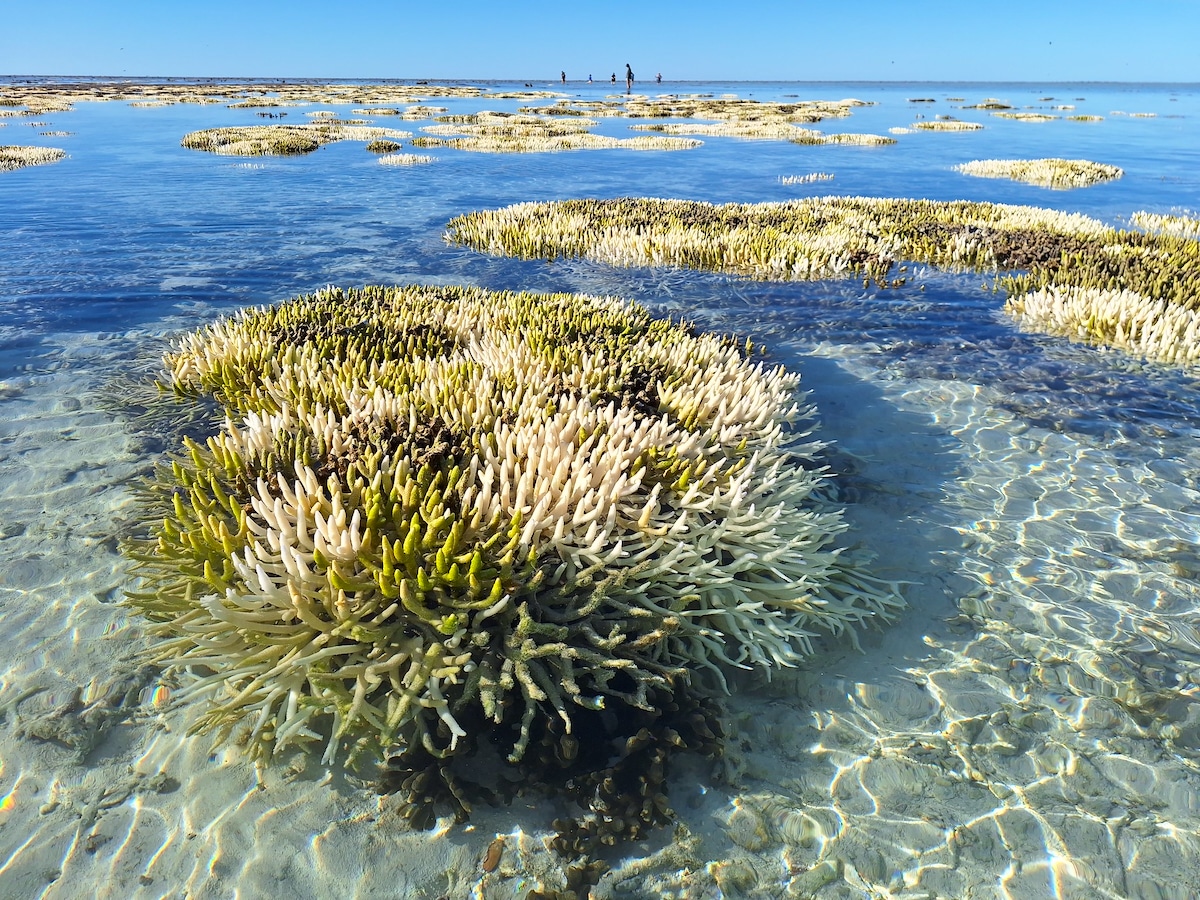Ecowatch
NOAA Confirms 4th Global Coral Bleaching Event as Climate Crisis Puts Reefs ‘Under Serious Pressure’

Coral bleaching at low tide on Heron Island in the southern Great Barrier Reef, Australia on April 10, 2024. John Turnbull / Flickr

Why you can trust us
Founded in 2005 as an Ohio-based environmental newspaper, EcoWatch is a digital platform dedicated to publishing quality, science-based content on environmental issues, causes, and solutions.
The planet is currently experiencing its fourth global coral bleaching event on record, affecting most of the Great Barrier Reef (GBR). It is the second mass bleaching in the past decade, NOAA scientists said in a press release.
Across the Pacific, Atlantic and Indian Ocean basins, heat stress at levels high enough to cause bleaching has been extensive, as monitored remotely by the National Oceanic and Atmospheric Administration (NOAA)’s Coral Reef Watch (CRW).
“From February 2023 to April 2024, significant coral bleaching has been documented in both the Northern and Southern Hemispheres of each major ocean basin,” said Derek Manzello, coordinator of NOAA CRW, in the press release.
CRW bases its sea surface temperature data on information gathered from NOAA and partner satellites from 1985 to the present.
For a bleaching event to be “global,” there must be significant bleaching in the three ocean basins over a one-year period, reported Reuters.
Since February 2023, mass bleaching has been detected among reefs in at least 54 nations and territories, CRW said.
Bleaching occurs when extreme water temperatures trigger corals to expel the vibrant algae that live in a symbiotic relationship with them, providing the corals with nutrients.
“More than 54% of the reef areas in the global ocean are experiencing bleaching-level heat stress,” Manzello said, as Reuters reported.
As with the current global bleaching event, the other three — 1998, 2010 and 2014 to 2017 — happened at the same time as the El Niño climate pattern, known to cause warmer sea surface temperatures. The combination of El Niño and climate change have resulted in ocean temperatures breaking long-standing records over the past year.
“As the world’s oceans continue to warm, coral bleaching is becoming more frequent and severe,” Manzello said in the press release. “When these events are sufficiently severe or prolonged, they can cause coral mortality, which hurts the people who depend on the coral reefs for their livelihoods.”
Mass coral reef bleaching has been recorded throughout the tropics since early last year, including in Florida, the Caribbean, the eastern Tropical Pacific, the GBR, Brazil, the Red Sea, Persian Gulf, the Gulf of Aden and the South Pacific.
Widespread bleaching has also been reported to NOAA in other areas of the Indian Ocean, including the Seychelles, Kenya, Tanzania, Mayotte, Tromelin and off Indonesia’s western coast.
Bleaching does not always mean affected corals will die. They can recover if the heat stress causing the bleaching diminishes in time.
“The bottom line is that as coral reefs experience more frequent and severe bleaching events, the time they have to recover is becoming shorter and shorter. Current climate models suggest that every reef on planet Earth will experience severe, annual bleaching sometime between 2040 and 2050,” Manzello said, as reported by The Guardian.
Three new alert levels were added to CRW’s worldwide coral bleaching warning system earlier this year to represent the increasing extremes impacting the planet’s ocean environments.
According to CRW data, in 2024 a record 80 percent of the GBR has been subjected to heat stress sufficient to cause bleaching. The iconic reef is currently suffering another mass bleaching — its fifth in eight years.
“[T]he prognosis is not good for coral reefs as we know them, and the GBR is not immune. We are certainly not giving up on reefs, but they’re under serious pressure,” said Dr. Roger Beeden, chief scientist at the Great Barrier Reef Marine Park Authority, as The Guardian reported.
Subscribe to get exclusive updates in our daily newsletter!
By signing up, you agree to the Terms of Use and Privacy Policy & to receive electronic communications from EcoWatch Media Group, which may include marketing promotions, advertisements and sponsored content.
Source
Disclaimer: No copyright infringement intended. All rights and credits reserved to respective owner(s).












